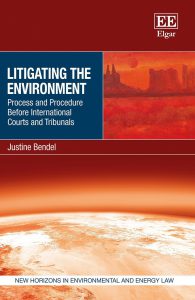
Volume 20/1
Seyedahmad Hosseini & Prerna Yadav
The Significance of Traditional Legal Framework in Regulating Groundwater Rights in Iran
Throughout history, water has been a crucial resource for the survival and development of civilisations worldwide. The legal framework for water regulation has been shaped by a complex system of formal and informal norms, rules, and regulations that have evolved over time in response to changing social, political, economic, and religious contexts. Groundwater resources have become increasingly important globally, and it is necessary to study how access to this resource has been determined in this context. Iran provides a valuable case study for understanding the evolution of the legal framework governing groundwater rights due to its long history and dependence on groundwater through the Kariz system. This paper examines the role played by changes in Iran’s religious and socio-political context in articulating groundwater rights, particularly the right to access groundwater, from the Sassanid Empire (224 CE) to the 1906 Iranian Constitution, covering a period of approximately 1700 years. Schlager & Ostrom’s framework for common pool resources is used to analyse this evolution in groundwater rights. Our analysis shows that though groundwater rights have primarily been treated as private rights, the changing socio-political and religious context through the centuries has helped with its regulation and management as a common pool resource. The study does not explore the process of management and the actors responsible for it which needs further elaboration to understand groundwater regulation.
Dr Paul Samuel Tamuno & Dr Uzuazo Etemire
Legal Inquiry into Mechanisms for Addressing the "Black Soot" Problem in Rivers State, Nigeria
Port Harcourt, a city in the Niger Delta area of Nigeria, has been plagued by the menace of soot in the last few years. This soot pollution, which has caught international attention has been attributed primarily to the widespread artisanal refining of stolen crude oil in illegal makeshift refineries and the burning of confiscated refineries with their chemical content by Nigerian military and para-military security agencies. This article examines in detail the causes of soot pollution in Port Harcourt, its impact on the environment, as well as the governments (inadequate) efforts to provide a solution to the menace. Importantly, the article addresses the primary question of what legal options are open to citizens and members of the public who wish to take action to address the soot pollution in order to protect their interests and enhancing the sustainable development of the city of Port Harcourt.
Vicent Bartholomew Mtavangu
The Efficacy of Administrative Orders and Sanctions in Regulating Corporate Environmental Crimes in Mining Areas in Tanzania
Administrative orders and sanctions take a lion’s share among the environmental regulatory techniques in the Tanzanian mining areas. They are preferred by environmental enforcement agencies to regulate corporate environmental crimes, among others because they are administered at low cost. Despite such prevalence, most of the mining companies, even those that were previously served with environmental administrative orders and sanctions, have never stopped committing environmental crimes. Thus, this paper argues that environmental administrative measures do not have a deterrent effect against mining companies that largely commit environmental crimes. As such, they should be amalgamated with the civil and criminal modes of enforcement for effective regulation of corporate environmental crimes in mining areas.
Al Khanif & Fenny Tria Yunita
Food and Land Policies amid the Agricultural Land Conversion in Indonesia
This article examines the shifting of land and food legal policies in Indonesia. It also discusses legal and political contexts, including historical and current contexts of policies on land and how such policies influenced Indonesian political spectrum. Firstly, it discusses the chaotic land ownership during the Sukarno Old Order era (1945-1966), followed by food politics under the Suharto New Order (1966-1998) and how the regime used rice as a political commodity. To give a more comprehensive analysis, the article then discusses the massive land conversion after Suharto era and how it affected expansion of agricultural land in the outer regions of Indonesia. The article also covers the extent to which the central government has developed legal policies to sustain their agricultural products in Indonesian national development plans. This article concludes that the national strategic project has become one of the main challenges in protecting agricultural land. The government must ensure that the land conversion should be aligned with the needs and priorities of farmers and rural communities to maintain sustainable development of the agriculture sector in Indonesia.
Germarié Viljoen
Public Trusteeship, the Reserve and the Water-Energy-Food (WEF) Nexus: Implications for Social Justice in South Africa’s Water Law
This study explores how South Africa’s water law has evolved to ensure fair and equitable access to water resources after the country’s transition to democracy. Emphasis is placed on the transformative impact of the National Water Act 36 of 1998 (NWA), which effectively ‘nationalised’ the country’s water resources. The NWA asserts water as ‘a scarce natural resource that belongs to all people’. To facilitate the notion of water belonging to all, the NWA introduced ground-breaking concepts like public trusteeship and the Reserve to the landscape of South African water law. The paper delves into the legal intricacies of the novel concepts, and enhances their practical application by integrating them within the Water-Energy-Food (WEF) Nexus framework. The paper critically reflects on the WEF Nexus framework and explores the extent to which the WEF framework supports or undermines gains made by the concepts of public trusteeship and the Reserve. The overarching aim is to elucidate their combined implications for social justice in the context of South Africa’s water law.
Book Reviews
Litigating the Environment: Process and Procedure Before International Courts and Tribunals

By Justine Bendel
Published by Edward Elgar (2023)
Reviewed by Collins Odote